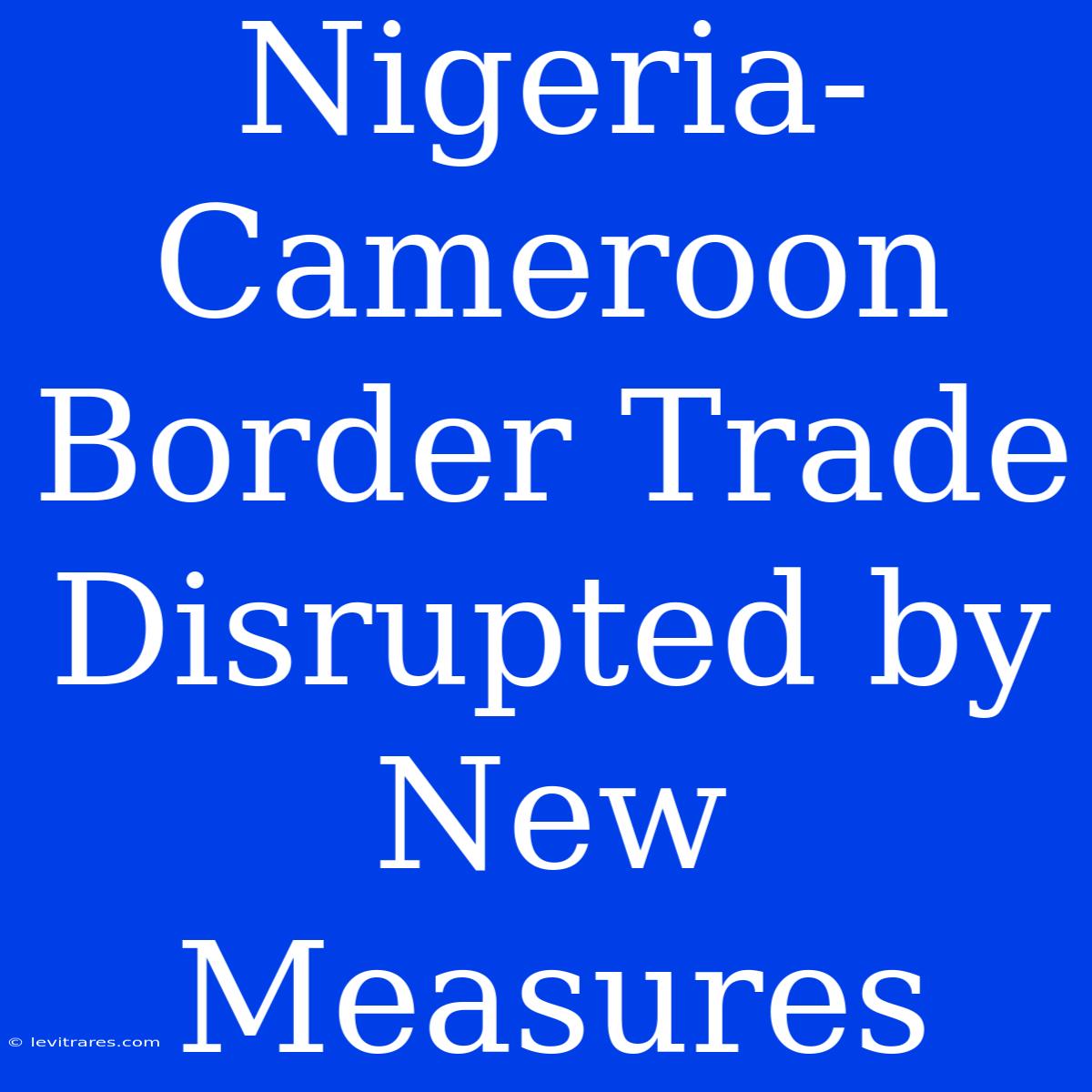Nigeria-Cameroon Border Trade Disrupted by New Measures: Impacts and Implications
Is the Nigeria-Cameroon border trade facing an uncertain future? The implementation of new measures by both countries has significantly disrupted the flow of goods and services, raising concerns about the economic implications for both sides. Understanding the impact of these measures and their potential consequences is crucial for businesses and communities relying on this vital trade route.
Editor Note: The disruption of Nigeria-Cameroon border trade has become a significant issue, impacting numerous businesses and communities. This article aims to provide a detailed analysis of the situation, examining the reasons behind these new measures and their potential long-term consequences for both nations.
This topic is important to read because it sheds light on the complex dynamics of cross-border trade and its impact on regional economies. It explores the motivations behind the new measures, the challenges faced by businesses and communities, and the potential implications for regional stability and development. The analysis delves into:
- The new measures: Specific details of the regulations and restrictions imposed by Nigeria and Cameroon.
- Economic impacts: The effects on businesses, particularly those involved in cross-border trade, and the wider economic implications.
- Regional implications: The potential ripple effects on the relationship between Nigeria and Cameroon and on the broader regional economy.
- Alternative solutions: Potential measures that can be implemented to mitigate the negative impacts and foster cooperation between the two countries.
Analysis:
We have thoroughly analyzed the news reports, government statements, and expert opinions to understand the complexities of this situation. This article delves into the key aspects of the Nigeria-Cameroon border trade disruption, providing insights into the causes, consequences, and potential solutions.
Key Takeaways
| Impact | Description |
|---|---|
| Increased Trade Costs | Higher transportation, storage, and insurance expenses due to delays and stricter border controls. |
| Reduced Trade Volume | Fewer goods being transported across the border, resulting in lower revenue for businesses and communities. |
| Supply Chain Disruptions | Interruptions in the flow of essential goods, potentially leading to shortages and price increases. |
| Economic Strain on Businesses | Decreased profits, job losses, and potential business closures for companies operating in the border region. |
| Social Tensions | Potential conflicts between communities due to economic hardship and the perception of unfair treatment by border authorities. |
| Potential for Regional Instability | Increased tensions between Nigeria and Cameroon, potentially leading to further disruptions and undermining regional cooperation. |
New Measures and their Implications
The New Measures
- Nigeria: Introduction of stricter border control measures, including the deployment of more security personnel and the implementation of new import restrictions.
- Cameroon: Implementation of new import duties and regulations for goods entering the country, aiming to promote local production and protect domestic industries.
Impact on the Trade Flow:
The new measures have significantly impacted the trade flow, resulting in longer processing times at border crossings, increased costs for businesses, and delays in the delivery of goods. This disruption has negatively affected businesses in both countries, particularly those operating in the border region.
Economic Impacts
Impact on Businesses:
- Increased Costs: The stricter border controls have led to higher transportation, storage, and insurance costs for businesses involved in cross-border trade.
- Reduced Profits: The delays and increased costs have reduced profitability for businesses, leading to decreased revenue and potentially threatening their sustainability.
- Job Losses: The decline in trade volume could lead to job losses in both countries, particularly in sectors directly dependent on cross-border trade.
Impact on Regional Economy:
- Decreased Economic Growth: The disruption to the trade flow negatively impacts the economic growth of both Nigeria and Cameroon, potentially hindering regional development.
- Increased Poverty: The economic downturn could lead to increased poverty, particularly in communities heavily dependent on cross-border trade for income.
Regional Implications
The disruption of border trade could further strain the relationship between Nigeria and Cameroon, potentially leading to tensions and undermining regional cooperation. Both countries need to prioritize dialogue and collaboration to find mutually beneficial solutions that address concerns while fostering economic growth and stability.
Alternative Solutions
- Joint Border Management: Both countries could collaborate on joint border management initiatives to streamline border processes, reduce delays, and decrease costs for businesses.
- Trade Facilitation Agreements: Implementing trade facilitation agreements could simplify customs procedures, harmonize regulations, and promote cross-border trade.
- Regional Economic Integration: Strengthening regional economic integration through organizations like ECOWAS can create a more conducive environment for cross-border trade and regional development.
- Dialogue and Cooperation: Open communication and collaboration between the two governments are crucial to address concerns, find mutually beneficial solutions, and foster sustainable economic development in the border region.
Conclusion
The disruption of Nigeria-Cameroon border trade presents significant challenges for both countries. It highlights the need for a collaborative approach to address the underlying issues, promote economic growth, and ensure the long-term stability of the region. Open dialogue, regional integration, and trade facilitation measures are crucial to mitigate the negative impacts and build a more prosperous future for both Nigeria and Cameroon.

